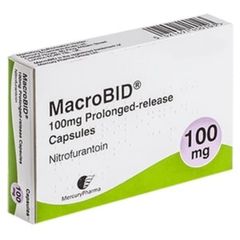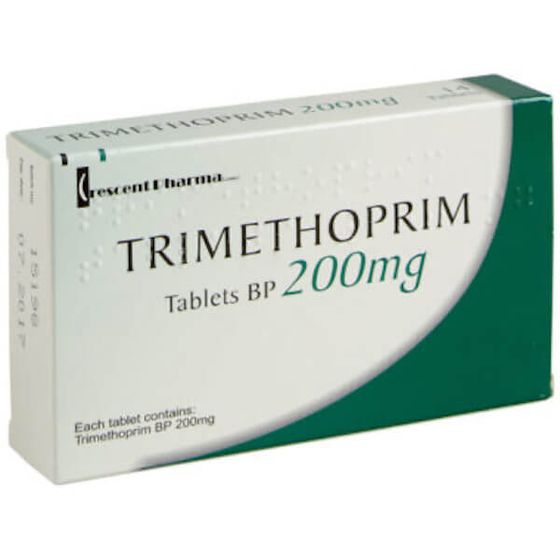- Home
- Treatments (Medications)
- Cystitis (UTI)
Cystitis (UTI)
Cystitis UTI is a common urinary tract infection causing burning sensations and frequent urination. Effective UTI antibiotic treatment can be prescribed through Chemist Doctor's online service after assessment by UK-registered doctors. Early treatment helps prevent complications.
Find Cystitis (UTI) Treatments

Nitrofurantoin Tablets

Trimethoprim Tablets
What Exactly Is Cystitis (UTI)?
Cystitis is a urinary tract infection that occurs when bacteria enter and multiply in your bladder. Imagine your urinary system as a series of connected tubes - when harmful microbes travel up the urethra (the tube carrying urine out), they can irritate the bladder lining, causing inflammation.
Women are particularly susceptible because their urethra measures only 4cm compared to men's 20cm. This shorter pathway allows bacteria easier access to the bladder. In fact, NHS data shows 50% of women experience at least one UTI by age 30.
Why Do UTIs Develop?
Most infections (80-90%) stem from Escherichia coli bacteria naturally present in your intestines. These microbes can transfer to the urethral opening through:
- Personal hygiene habits: Wiping back-to-front after using the toilet
- Sexual activity: Friction can push bacteria toward the urethra
- Contraceptive use: Spermicides may disrupt protective vaginal flora
Post-menopausal women face higher risks due to estrogen decline reducing natural urinary tract protection. Those with diabetes or kidney conditions should be particularly vigilant, as persistent high blood sugar can encourage bacterial growth.
Recognising Cystitis (UTI) Symptoms
Early cystitis often feels like:
- A burning sensation when urinating (dysuria)
- Persistent urge to urinate, even with an empty bladder
- Cloudy urine with a strong ammonia-like odour
Many patients report symptoms developing rapidly, often within 2-3 hours of initial discomfort. The NHS notes that prompt treatment typically resolves most cases within 72 hours.
When to Seek Immediate Care:
If you develop fever (≥38°C), flank pain, or nausea, contact your GP immediately. These warning signs may indicate a kidney infection requiring prompt treatment.
Cystitis (UTI) Treatment Options
Treatment depends on symptom severity:
1. Mild Cases
For initial symptoms lasting <48 hours:
- Increase water intake to flush bacteria
- Use over-the-counter cystitis sachets (e.g., Cystopurin®) to reduce urine acidity
- Take paracetamol for pain relief
2. Antibiotic Treatment
If symptoms persist beyond 2 days or worsen, eMC guidelines recommend:
| Antibiotic | Course Length | Effectiveness |
|---|---|---|
| Nitrofurantoin 100mg | 3 days | 94% success rate |
Important: Complete the full antibiotic course even if symptoms improve. Stopping early risks creating antibiotic-resistant bacteria.
Proven Cystitis (UTI) Prevention Strategies
Reduce recurrence risk with these evidence-based methods:
Hygiene Practices
Always wipe front-to-back after bowel movements. This simple habit prevents transferring anal bacteria to the urethral area.
Post-Coital Care
Urinate within 30 minutes after intercourse. This helps flush out any bacteria introduced during sexual activity.
Clothing Choices
Opt for cotton underwear and avoid tight-fitting trousers. Breathable fabrics reduce moisture where bacteria thrive.
Where Can I Buy Cystitis (UTI) Antibiotics Online in the UK
Secure Cystitis (UTI) Treatment Prescription & Next-Day Delivery Service
Order cystitis treatment with confidence through our UK-registered medical prescribers, who review all requests within 4 working hours. We guarantee same-day prescription approval for eligible patients and dispatch orders placed before 3pm for next-day tracked delivery.
Our UTI treatment service combines competitive pricing with strict adherence to MHRA safety standards, ensuring your medication is dispensed through GPhC-registered pharmacies. Every purchase includes discreet packaging and a GDPR-compliant consultation process.
Our clinical team ensures:
- Full medical history review
- Drug interaction checks
- Ongoing safety monitoring
Always consult your GP for first-time symptoms or complex medical history.
Cystitis (UTI) FAQs
What is Cystitis and what causes it?
Cystitis is inflammation of the bladder, most commonly caused by bacterial infection. The primary culprit is E. coli bacteria, which normally lives harmlessly in the intestines but can cause infection if it enters the urinary tract. Other causes include irritation from sexual activity, certain hygiene products, or urinary retention.
What's the difference between Cystitis, UTI, and bladder infection?
Cystitis specifically refers to bladder inflammation, while UTI (urinary tract infection) is a broader term for infections anywhere in the urinary system. A bladder infection is essentially the same as cystitis when caused by bacteria. These terms are often used interchangeably in everyday language.
What are the main symptoms of Cystitis?
Common Cystitis symptoms include:
- Burning or stinging during urination
- Frequent, urgent need to urinate
- Passing only small amounts of urine
- Cloudy, dark, or strong-smelling urine
- Pelvic discomfort or pressure
How is Cystitis treated?
Treatment options include:
- Pain relief: Over-the-counter painkillers like paracetamol or ibuprofen
- Urine alkalinizers: Products like Cystopurin or Cymalon to reduce discomfort
- Antibiotics: Trimethoprim is commonly prescribed, with alternatives available if needed
- Self-care: Drinking plenty of fluids and resting
How long does Cystitis take to clear up?
With antibiotic treatment, symptoms often improve within 24-48 hours. Mild cases may resolve on their own in 3-4 days. Always complete the full antibiotic course even if you feel better earlier. If symptoms persist beyond 48 hours of treatment, consult your doctor.
Can men get Cystitis?
While less common in men due to their longer urethra, men can develop cystitis. Male cystitis often requires medical evaluation to rule out underlying conditions like prostate issues or urinary obstructions.
Why do I keep getting recurrent Cystitis?
Recurrent Cystitis may be caused by:
- Improper wiping technique (always wipe front to back)
- Sexual activity introducing bacteria
- Holding urine for prolonged periods
- Weakened immune system
- Hormonal changes (especially in postmenopausal women)
Can Cystitis lead to serious complications?
If left untreated, Cystitis can potentially develop into a kidney infection (pyelonephritis), which is more serious and may require hospital treatment. This occurs when bacteria travel up from the bladder to the kidneys.
Do antibiotics for Cystitis affect my contraceptive pill?
Most Cystitis antibiotics, including trimethoprim, don't interfere with contraceptive pills. Only specific antibiotics like rifampicin (used for tuberculosis) are known to reduce contraceptive effectiveness.
Can I drink alcohol while taking Cystitis antibiotics?
While trimethoprim doesn't directly interact with alcohol, drinking may worsen Cystitis symptoms and delay healing. It's generally recommended to avoid alcohol until symptoms resolve.
Does cranberry juice help with Cystitis?
Cranberry products may help prevent Cystitis by making it harder for bacteria to stick to bladder walls, but evidence for treating active infections is limited. They shouldn't replace proper medical treatment for existing infections.
Why antibiotics might cause thrush?
Antibiotics can disrupt the natural balance of bacteria and yeast in the vagina, sometimes leading to thrush (candida overgrowth). This is easily treated with antifungal medications if it occurs.
Should I wash more frequently to help Cystitis heal?
Excessive washing, especially with soap, can irritate the area further and disrupt protective bacteria. Gentle cleansing with water is sufficient, and avoid douches or perfumed products.
 | Authored by Nabeel |
Medical Content Manager
Nabeel is a co-founder, and medical content manager of Chemist Doctor. He works closely with our medical team to ensure the information is accurate and up-to-date.
 | Reviewed by Dr. Waqas (GMC:7928708) |
Medical Doctor
Dr. Waqas is a GMC-registered doctor at Chemist Doctor, specialising in general health. He balances clinical precision with cultural sensitivity.
 | Approved by Usman |
Medical Director
Usman is a co-founder, and medical director of Chemist Doctor. He leads the organisation's strategic vision, bridging clinical and operational priorities.
Review Date: 08 May 2025
Next Review: 14 December 2025
Published on: 08 May 2025
Last Updated: 09 May 2025







